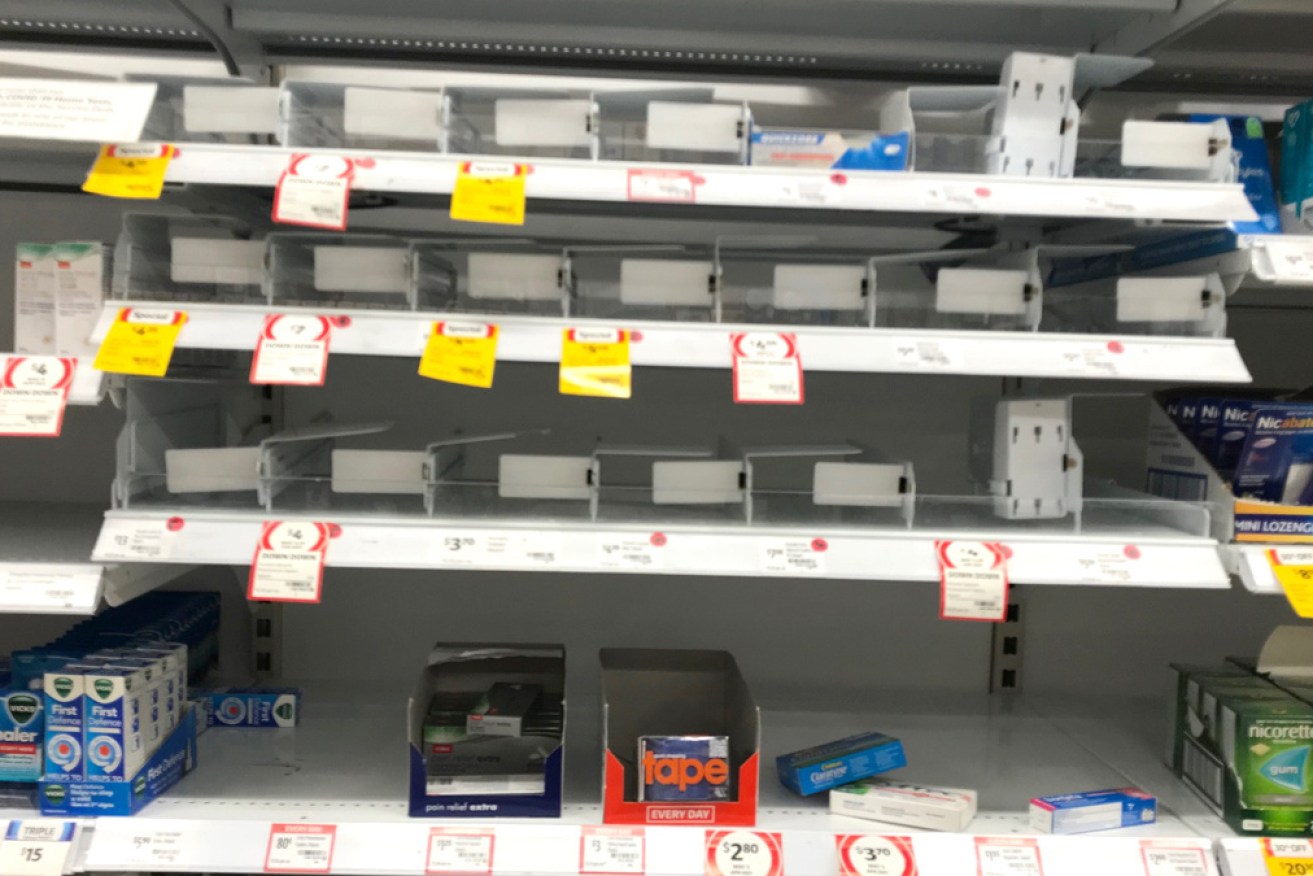‘No RATs, no Panadol’: Australia’s COVID supply crisis escalates


Common painkillers such as paracetamol and ibuprofen are being stripped from Australian shelves. Photo: Twitter
Unions have demanded an urgent meeting with the Prime Minister as the nationwide supply crisis heats up – with common painkillers joining the products stripped from shelves across Australia.
Painkillers such as Panadol and Nurofen have joined meat, toilet paper and other essentials in being cleared from Australian supermarkets and other shops as panic buying escalates along with the Omicron COVID wave.
The run on over-the-counter treatments came after deputy chief health officer Professor Michael Kidd urged Australians to stock up, as COVID infections rocketed daily.
Tweet from @Toey_tucker
The country’s exploding virus caseload has also exacerbated supply chain problems as thousands of distribution staff are forced into isolation due to COVID exposure.
The situation is so bad that Coles introduced a two-pack purchase limit on mince, chicken breasts, chicken thighs and sausages at the weekend, while Woolworths said supply of some foods remained “patchy”.
KFC confirmed this week it had cut some menu items due to supply issues – while chicken supplier Ingham’s told the ASX it was “experiencing significantly lower levels of staff availability, which is impacting production volumes and operational efficiency”.
“The operational and trading difficulties have resulted in significant operational inefficiency, additional costs and the temporary suspension of a number of Ingham’s products,” chief executive and managing director Andrew Reeves said.
“Ingham’s is working closely with our customers and we are focused on supplying as much product as possible to customers while the current disruption continues.”
The company said it could not predict how long the supply constraints would be felt. Elsewhere, consumers have been warned the supermarket shortages could last up to three weeks.
On Tuesday, Deputy Prime Minister Barnaby Joyce said the country hadn’t run out of food but Australians needed to “cool their heels a bit” and act rationally as Omicron continues to spread.
“We have to stop hoarding stuff, take what you need not more than what is required,” he told Sky News.
“The food is there, we are not going to run out of food. What we will run out of is common sense if people start running in and swiping everything off the shelves because they think we’re going to Armageddon.”
The Australian Council of Trade Unions has called for an urgent meeting with the federal government to discuss the impact of the spread of the Omicron variant on exhausted essential workers.
ACTU secretary Sally McManus wrote to PM Scott Morrison with a list of demands warning an “unofficial lockdown” was hurting affected workers.
“Australian workers are not OK at the moment. We have never had so many working people sick at once,” she said.
Tweet from @damethelog
The demands include restoring pandemic leave for workers who are close contacts of infected colleagues, rather than just household contacts.
Ms McManus also wants rapid tests to be free for everyone and prioritised for front-line workers, safer work conditions including N95 or P2 masks for workers, and the restoration of income support for people who’ve been left without pay due to the virus.
“There’s a big crisis happening at the moment and there’s some action he could take,” she told Melbourne’s 3AW on Tuesday.
“Getting advice from everyone affected – especially when the people at the moment who are most affected are front-line workers – is really critical because actually we’re going to have blind spots and I think at the moment there are a few blind spots.”
Mr Morrison wants national cabinet to help ease the pressure on supermarket shelves, by relaxing isolation rules so that workers listed as close contacts can return to work if they test negative for the virus.
Workers with COVID-19 would still have to isolate, but the change is slated to allow tens of thousands of staff to return to work within a fortnight.
Mr Morrison said the relaxed rules would apply to workers with jobs related to supplying food. However, he said the government was looking to extend it soon, including to people in consumer-facing jobs.
Retailers, pubs, cafes and restaurants are pleading for the exemptions to be extended.
Australian Retailers Association chief executive Paul Zahra said workers who tested negative should be able to return as soon as possible. He also wants a free and reliable supply of rapid tests for essential retail and distribution centre workers and a reporting mechanism for rapid test results.
“More needs to be done to ease the pressure on this critical workforce so they can adequately staff their stores and move essential goods efficiently across the country,” he said.
“It’s important that all levels of government continue to work with industry to clear any impediments to getting people safely back to work and return domestic supply chains to a more sustainable footing.”
NSW reported 25,870 COVID cases and 11 deaths on Tuesday, as the state government mulled forcing residents to report positive at-home rapid test results.
In Victoria, there were 37,994 COVID cases and 13 deaths, with the strain of the virus caseload again hitting essential public services such as ambulances.
-with AAP








